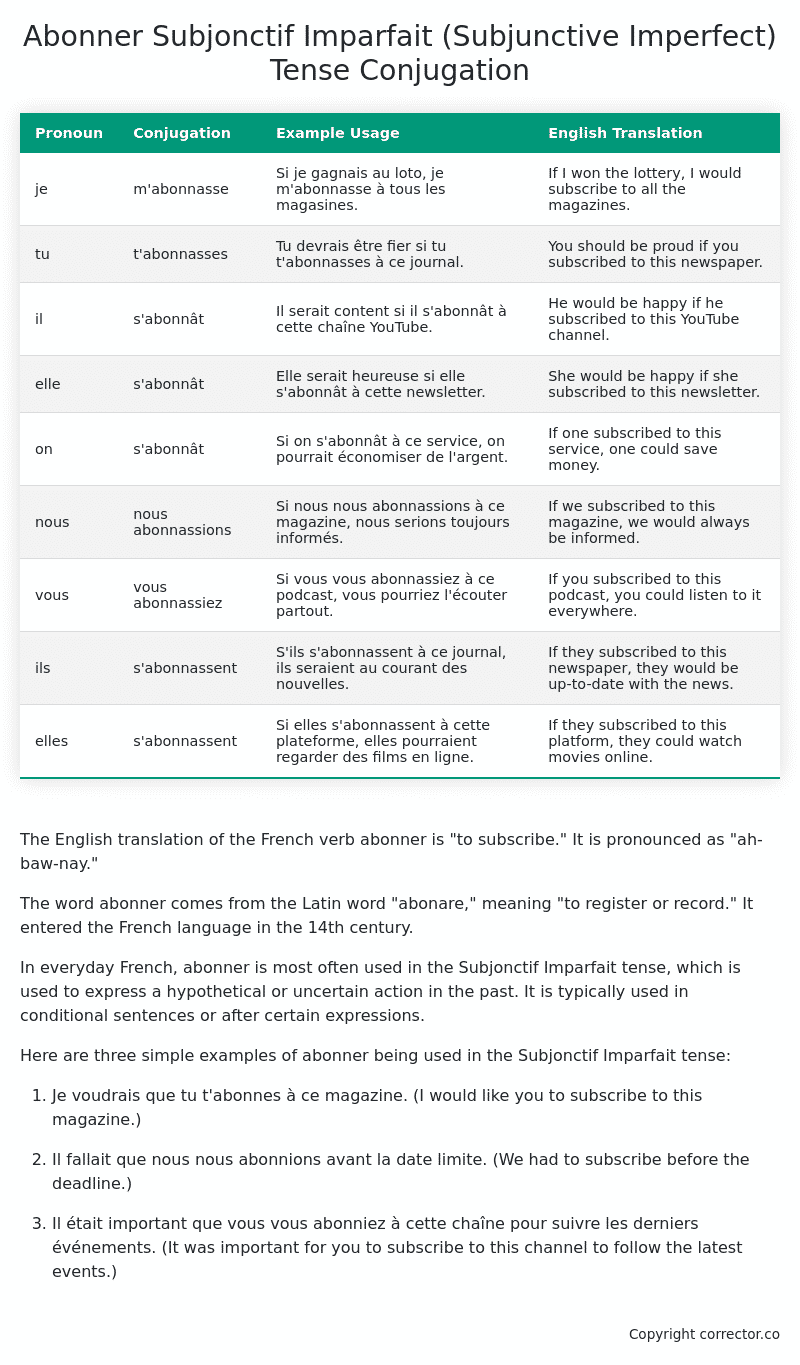Subjonctif Imparfait (Subjunctive Imperfect) Tense Conjugation of the French Verb abonner
Introduction to the verb abonner
The English translation of the French verb abonner is “to subscribe.” It is pronounced as “ah-baw-nay.”
The word abonner comes from the Latin word “abonare,” meaning “to register or record.” It entered the French language in the 14th century.
In everyday French, abonner is most often used in the Subjonctif Imparfait tense, which is used to express a hypothetical or uncertain action in the past. It is typically used in conditional sentences or after certain expressions.
Here are three simple examples of abonner being used in the Subjonctif Imparfait tense:
-
Je voudrais que tu t’abonnes à ce magazine. (I would like you to subscribe to this magazine.)
-
Il fallait que nous nous abonnions avant la date limite. (We had to subscribe before the deadline.)
-
Il était important que vous vous abonniez à cette chaîne pour suivre les derniers événements. (It was important for you to subscribe to this channel to follow the latest events.)
Table of the Subjonctif Imparfait (Subjunctive Imperfect) Tense Conjugation of abonner
| Pronoun | Conjugation | Example Usage | English Translation |
|---|---|---|---|
| je | m’abonnasse | Si je gagnais au loto, je m’abonnasse à tous les magasines. | If I won the lottery, I would subscribe to all the magazines. |
| tu | t’abonnasses | Tu devrais être fier si tu t’abonnasses à ce journal. | You should be proud if you subscribed to this newspaper. |
| il | s’abonnât | Il serait content si il s’abonnât à cette chaîne YouTube. | He would be happy if he subscribed to this YouTube channel. |
| elle | s’abonnât | Elle serait heureuse si elle s’abonnât à cette newsletter. | She would be happy if she subscribed to this newsletter. |
| on | s’abonnât | Si on s’abonnât à ce service, on pourrait économiser de l’argent. | If one subscribed to this service, one could save money. |
| nous | nous abonnassions | Si nous nous abonnassions à ce magazine, nous serions toujours informés. | If we subscribed to this magazine, we would always be informed. |
| vous | vous abonnassiez | Si vous vous abonnassiez à ce podcast, vous pourriez l’écouter partout. | If you subscribed to this podcast, you could listen to it everywhere. |
| ils | s’abonnassent | S’ils s’abonnassent à ce journal, ils seraient au courant des nouvelles. | If they subscribed to this newspaper, they would be up-to-date with the news. |
| elles | s’abonnassent | Si elles s’abonnassent à cette plateforme, elles pourraient regarder des films en ligne. | If they subscribed to this platform, they could watch movies online. |
Other Conjugations for Abonner.
Le Present (Present Tense) Conjugation of the French Verb abonner
Imparfait (Imperfect) Tense Conjugation of the French Verb abonner
Passé Simple (Simple Past) Tense Conjugation of the French Verb abonner
Passé Composé (Present Perfect) Tense Conjugation of the French Verb abonner
Futur Simple (Simple Future) Tense Conjugation of the French Verb abonner
Futur Proche (Near Future) Tense Conjugation of the French Verb abonner
Plus-que-parfait (Pluperfect) Tense Conjugation of the French Verb abonner
Passé Antérieur (Past Anterior) Tense Conjugation of the French Verb abonner
Futur Antérieur (Future Anterior) Tense Conjugation of the French Verb abonner
Subjonctif Présent (Subjunctive Present) Tense Conjugation of the French Verb abonner
Subjonctif Passé (Subjunctive Past) Tense Conjugation of the French Verb abonner
Subjonctif Imparfait (Subjunctive Imperfect) Tense Conjugation of the French Verb abonner (this article)
Subjonctif Plus-que-parfait (Subjunctive Pluperfect) Tense Conjugation of the French Verb abonner
Conditionnel Présent (Conditional Present) Tense Conjugation of the French Verb abonner
Conditionnel Passé (Conditional Past) Tense Conjugation of the French Verb abonner
L’impératif Présent (Imperative Present) Tense Conjugation of the French Verb abonner
L’infinitif Présent (Infinitive Present) Tense Conjugation of the French Verb abonner
Struggling with French verbs or the language in general? Why not use our free French Grammar Checker – no registration required!
Get a FREE Download Study Sheet of this Conjugation 🔥
Simply right click the image below, click “save image” and get your free reference for the abonner Subjonctif Imparfait tense conjugation!

Abonner – About the French Subjonctif Imparfait (Subjunctive Imperfect) Tense
Formation
Common Everyday Usage Patterns
Interactions with Other Tenses
Subjonctif Présent
Indicatif Passé Composé
Conditional
Conditional Perfect
Summary
I hope you enjoyed this article on the verb abonner. Still in a learning mood? Check out another TOTALLY random French verb conjugation!


